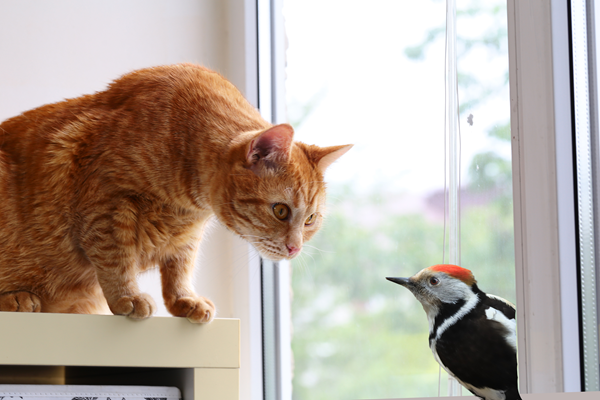
What Is avian flu and why should you be concerned?
Avian flu (also known as avian influenza or bird flu) is a viral infection caused by influenza type A viruses. It primarily affects wild birds and domestic poultry. The H5N1 strain is of particular concern due to its ability to spread rapidly and potentially infect non-avian species, including mammals like dogs and cats.
During outbreaks, the virus can spread through contact with infected birds, their droppings, feathers, or contaminated environments. Wild birds are the primary carriers, but backyard poultry and pet birds may also be at risk, especially during significant outbreaks.
Can dogs, cats, and pet birds get avian flu?
Dogs and cats can be infected with avian flu, although cases are rare. Pets are at risk if they come into contact with infected birds, droppings, or contaminated surfaces. Pets might be exposed through hunting or eating raw poultry or unpasteurized milk.
Pet birds are at much higher risk of contracting avian flu than dogs or cats, especially pet birds that live outdoors or come into contact with wild birds. They may be infected if exposed to wild birds, bird droppings, or contaminated feed and water. Birds kept indoors have a lower risk but can still be exposed if their food, bedding, or enclosures are contaminated.
What are the signs of avian flu in pets?
Dogs and cats: As cases are rare, the disease process is not fully understood. Infected dogs or cats may show non-specific signs, including:
- Respiratory issues: Coughing, sneezing, nasal discharge
- Conjunctivitis: Eye discharge and redness
- Lethargy: Unusual tiredness or reluctance to move
- Loss of appetite: Losing interest in food or water
- Fever: A higher-than-normal body temperature
- Neurological symptoms: Rare, but may include wobbliness or seizures
Pet birds: The symptoms of avian flu can vary based on the severity of the infection. Watch for:
- Sudden death: Some strains, like H5N1, can be fatal in birds with little warning.
- Respiratory symptoms: Coughing, nasal discharge, wheezing, or difficulty breathing
- Swelling: Swelling of the head, neck, or eyes
- Behavioral changes: Lethargy, decreased activity, or unusual behavior
- Loss of appetite: Losing interest in food or water
- Diarrhea
- Reduced egg production: If your bird normally lays eggs, a sudden decrease in production could be a sign of illness
- Neurological symptoms: Includes incoordination
If you notice any of these symptoms in your pets or birds, contact your veterinarian immediately. Early detection and treatment are critical.
How can we protect dogs, cats, and pet birds from avian flu?
Taking preventative measures can help protect your furry or feathered pets from avian flu.
Dogs and Cats
- Limit Contact with Birds:
- Prevent pets from interacting with wild birds, bird droppings, or bird feeders.
- Keep dogs on a leash and supervise outdoor activities.
- Supervise Outdoor Time:
- Keep cats indoors, especially during outbreaks, to reduce hunting of infected birds.
- Monitor dogs in your yard to ensure they don’t interact with birds or contaminated areas.
- Practice Good Hygiene:
- Clean and disinfect pet food and water bowls regularly, especially those kept outside.
- Wash your hands thoroughly after handling birds, bird feeders, or any outdoor surfaces that might be contaminated.
- Avoid Feeding Pets Raw Poultry or Unpasteurized (Raw) Milk:
- Refrain from giving your pets raw or undercooked poultry products or raw milk, as they can harbor viruses and bacteria.
Pet Birds
- Keep Your Birds Indoors:
- Reduce the risk of exposure by keeping pet birds inside, especially during an outbreak.
- Secure Their Environment:
- Cover outdoor aviaries or cages with mesh that prevents wild birds from getting in.
- Store bird feed in sealed containers to avoid contamination.
- Monitor for Symptoms:
- Watch your pet bird closely for any unusual behavior or health changes.
- If you notice respiratory symptoms or behavioral changes, consult your avian veterinarian right away.
- Maintain Hygiene:
- Clean and disinfect bird cages, perches, and feeders regularly. Use a bird-safe disinfectant to prevent the spread of pathogens.
- Source Feed Safely:
- Ensure that bird food, bedding, and water are sourced from trusted suppliers to avoid contamination.
What additional precautions should I take during an outbreak?
If there’s an avian flu outbreak in your area, it’s important to be extra cautious.
- Monitor local reports: Stay informed about outbreaks in wild birds, poultry farms, or other areas near you.
- Avoid high-risk areas: Keep pets and birds away from farms, wetlands, or parks where infected birds might congregate.
- Consult your vet: Contact your veterinarian if you have concerns about your pet’s exposure or health. For pet birds, an avian veterinarian can offer additional guidance tailored to their needs.
When to Call Your Veterinarian
If your pet dog, cat, or bird shows any signs of illness after potential exposure to wild birds, droppings, or contaminated environments, contact your veterinarian immediately. Early intervention can make all the difference. Find more information on the American Veterinary Medical Association website.
Resources:
- Worms and Germs Blog
- CDC (Centers for Disease Control and Prevention)
- WOAH (World Organisation for Animal Health)
- AVMA (American Veterinary Medical Association)
- USDA APHIS (Animal and Plant Health Inspection Service)
